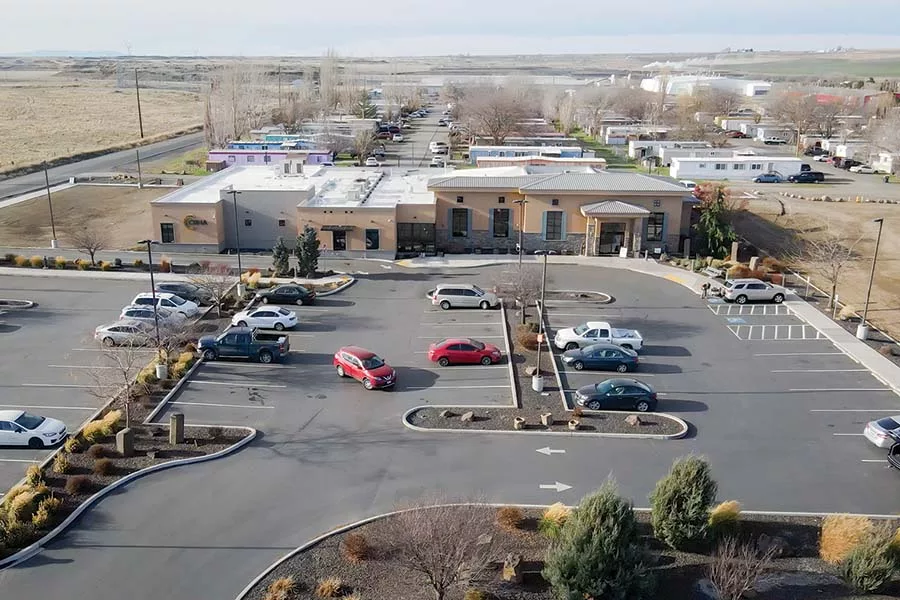
Home » Rising costs delay plans for fourth CBHA clinic
Rising costs delay plans for fourth CBHA clinic

February 10, 2023
Columbia Basin Health Association is coming to Pasco.
The small health system, which operates clinics in Othello, Connell and Mattawa, bought an 18-acre site at the northeast corner of North Road 68 and Three Rivers Drive and plans to build a 27,000-square-foot facility on six of the acres.
CBHA had originally hoped to see completion of the facility during the summer of 2024.
“Covid has put a dent in a lot of things,” said CBHA CEO Nieves Gomez. “The most recent inflation is making it very difficult to continue to grow, especially in health care.”
He said health care providers can’t simply raise prices like a restaurant where the price of menu items can be raised in response to increases in the costs of inputs.
The federally qualified health center provides medical, dental, mental health, eye care, pharmacy services, health and nutritional coaching, maternity education and more – all under one roof.
Six years ago, CBHA moved its first clinic in Othello from Main Street to a new state-of-the-art 78,000-square-foot facility off 14th Avenue near Highway 26.
“What we invested in that one is now double the price for a smaller building,” Gomez said, referring to cost for the new Pasco clinic.
“We’ve acquired the land and done the assessments … We would love to build a clinic like we built in Othello, but that’s not the world we live in right now,” he said.
At this time, CBHA does not have its own board’s approval to build a Pasco facility, but is currently in the design phase with an architectural firm.
Gomez emphasized that a clinic is coming despite the unknown timeline.
A Tri-City need
Based on market analysis, there is a need in the Tri-Cities.
CBHA estimates it served more than 39,000 unique patients across 200,000 visits between their three clinics last year – a record year.
Of those 39,000, over 3,500 were from the Pasco area, and 55% of the Connell clinic’s nearly 7,500 patients hailed from a Tri-City zip code.
CBHA prides itself on providing care to people regardless of their ability to pay, predominantly serving Medicaid-managed and uninsured patients at a proportion of 54% and 19%, respectively, of their payor mix.
Privately insured patients make up 21% of their base and Medicare-provided makes up 7%.
Upon further analysis, Gomez and his team found that Franklin County ranks last in population-to-provider ratios and that there is a big need for behavioral health and dental services, as well as providers accepting Medicaid-insured patients in general.
There are some 25,000 to 30,000 Tri-City residents on Medicaid, according to CBHA’s market research.
“Behavioral health is our fastest growing service line,” Gomez said. “It doubled in size within the past year due to several factors, but especially among kids. He noted the turbulence experienced by many when schools switched to online schooling, then later reopened for in-person attendance.
“We exist to keep folks who don’t need to be in the hospital out of the hospital,” Gomez said, referring to the tendency for uninsured people to simply go to emergency rooms with nonemergent medical issues since ERs are required by law to treat those who come through their doors, regardless of their ability to pay.
This jams up services for those with emergency medical needs and doesn’t always result in the care the patient needs, as ER staff are not necessarily trained or equipped to deal with chronic conditions or other nonemergent issues.
At CBHA, staff strive to offer same-day and next-day appointments to see primary care providers, further reducing the rate of ER visits.
Rooted in community
CBHA opened its first clinic in Othello in 1973 to fill a void for the medically underserved. Next came Mattawa, followed by Connell.
Though CBHA is a federally qualified health center, it receives the majority of its funding, 49%, from patient services, followed by 24% from premiums, 23% from grants and 4% from other sources.
More than half of CBHA’s board of directors must represent the individuals that their clinics serve based on factors such as race, ethnicity and gender, and the majority must be patients of CBHA.
“We are a highly culturally sensitive organization; 100% of my clinics we employ from the city where they (are located),” Gomez said, noting that half of CBHA’s providers speak Spanish fluently, while the other half are put through Spanish language courses to help bridge communication gaps.
“Community’s a big thing for us,” he said. “If you don’t have a good reputation in the community, you just won’t win.”
“We don’t wait for people to come to us, we go out to the community, to orchards, to farms,” he said, adding that almost half of CBHA’s patients are agricultural workers and almost half are infants to 18.
CBHA has hosted Covid-19 vaccine events and offered testing on an ongoing basis.
They have been partnering with neighboring schools in Othello and Mattawa on a grant to provide hybrid school-based health care in which a consultant is available so school counselors can provide same-day referrals.
CBHA also gets involved with and organizes community events such as food distributions and color runs, which raise money to provide more youth activities in the communities they serve.
“We pride ourselves on being known as a top performer in quality, efficiency and building design,” Gomez said.
He said that last year CBHA won five national awards for employee engagement and was ranked in the top 7% of federally qualified health centers nationally. “We are one of only two gold standard FQHCs in Washington state.”
CBHA made Modern Healthcare’s list of Best Places to work for 2022, 2021 and 2020. It was also the winner of the 2022 Best and Brightest Companies to Work for in the Nation as well as the Pacific Northwest.
CBHA also received the Health Resources and Services Administration Health Center Program 2022 award for being an access enhancer, health disparities reducer and health center quality leader.
“If you have happy employees, you have happy customers,” Gomez said. “CBHA is a high-quality health care delivery system that’s well integrated and would be a great partner for the Pasco area.”
Local News Health Care
KEYWORDS february 2023





